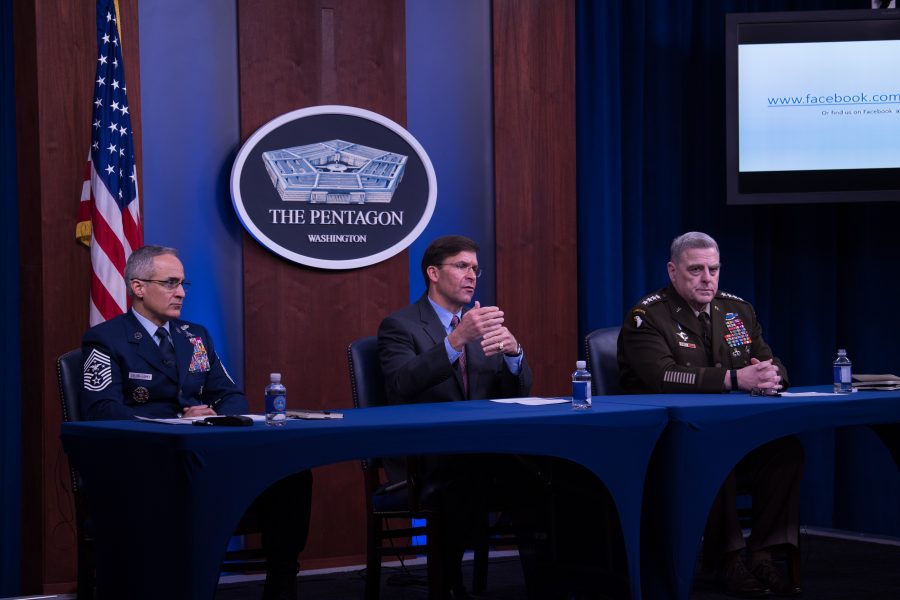The crisis caused by the new coronavirus outbreak could take months and weaken military readiness, though that drop is expected to be small, the top military leaders told service members in an online town hall March 24.
Chairman of the Joint Chiefs of Staff Gen. Mark Milley, Defense Secretary Mark Esper, and USAF Chief Master Sgt. Ramón Colón-López, the senior enlisted adviser to the Chairman, took submitted questions from the military community for a live-streamed town hall.
When asked when the outbreak will end and operations will return to normal, Milley said, “Nobody knows that.” Based on the timelines seen in places such as China and South Korea, it could be 90 days, but it also could be longer based on how the U.S. reacts. “But we will get through it. It’s not a question of when, we will get through it. And we’ll pull together as a country and as a military,” he emphasized.
Milley said he expects to see “moderate to low levels of readiness impacts” because of exercise cancelations and other changes to current operations, and Esper said the military must “be very careful and take prudent measures to maintain that readiness.”
On the global scale, the leaders have seen other nations, including adversaries, change their perspective and start “turning inward right now, looking closely at their own internal affairs.”
Italy, for example, has suffered the most and the U.S. has reached out to send aid. Iran, an adversary, has also been “suffering very badly,” and the U.S. has even reached out to Tehran to offer aid and support, Esper said.
“Over time, this may present challenges,” he said, adding that “potential adversaries and adversaries could act out in different ways,” such as using the chaos created by the outbreak to sow uncertainty through online disinformation campaigns and other means. The military must “be conscious and look out for that,” Esper said.
In the future, Milley added, this could have second- and third-order effects if the global economy falls into a recession.
“This is affecting different countries differently,” he said. “In some cases it could lead to social breakdowns, it could lead to political chaos in certain areas.”
To mitigate the risk of personnel contracting COVID-19, the disease caused by the new coronavirus, the military halted almost all travel, instituted telework for most non-essential personnel, and it is working to increase testing. However, many daily operations are continuing like normal for those who can’t telework.
At the local level, commanders are being trusted to decide whether certain actions, such as all-calls, should continue, Colón-López said. “There’s a mission requirement for a lot of units” that includes meetings such as this, and the leaders are “trusting commanders and medical officials to take the prudent steps to contain the spread,” he said.
While the travel guidance and requirements for quarantines have caused a lot of uncertainty, and extended some deployments longer than expected, it is something the military community can work through together. The military has established care plans to help families while deployed service members are away for extended periods of time and, “We trust the chain of command is exercising those plans to take care of people,” Colón-López said.
“Uncertainty is nothing new for us. That’s what military members and families do on a daily basis,” Colón-López said. “We need to continue to take care of one another, to take care of our neighbors, for those deployed.”
